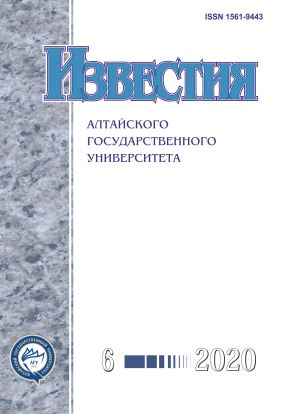Securitization of Memory Politics and Identity Politics as Academic and Political Tools
УДК 33:94 ББК 65.03(0)
Abstract
The article discusses securitization of memory politics and identity politics as a part of academic tools and some kind of political tools. The author characterizes the process of securitization analyzing both academic and political discourse of the last decade. The securitization of the politics of memory and identity, as well as the politicization of history are reflected in academic publications and political declarations, pouring out into hot discussions, debates, wars of memory, struggle of identities. Research findings can create basis for a political turn or a new foreign policy course. Securitization puts the category of identity in the context of international security while identity politics could be used as a soft power element or foreign policy tool. There has been a turn towards defining identity politics as a concrete ideological weapon that can be used against opponents in the ideological and political struggle. This significantly changes meaning of identity politics. The author considers that in scientific analysis it is advisable to avoid extreme politization of identity.
Downloads
Metrics
References
Политика памяти в современной России и странах Восточной Европы. Акторы, институты, нарративы / под ред. А.И. Миллера и Д.В. Ефременко. СПб., 2020.
Арон Р. Мир и война между народами. М., 2000.
Малинова О.Ю. Режим памяти как инструмент анализа: проблемы концептуализации // Политика памяти в современной России и странах Восточной Европы. Акторы, институты, нарративы / под ред. А.И. Миллера и Д.В. Ефременко. СПб., 2020.
Национальные истории на постсоветском пространстве - II / под ред. Ф. Бомсдорфа и Г. Бордюгова. М., 2009.
Malksoo M.A. Baltic Struggle for a “European Memory”: The Militant Mnemopolitics of the Soviet Story // Journal of Genocide Research. 2018. Vol. 4. N.4.
Tapon F. Hidden Europe. What Eastern Europeans Can Teach Us. San Francisco, 2012.
Kolev K. Weak Pluralism and Shallow Democracy: the Rise of Identity Politics in Bulgaria and Romania // East European Politics. 2020. Vol. 36. №2.
Rev I. Liberty Square, Budapest: How Hungary Won Ше Second World War // Journal of Genocide Research. 2018. Vol. 20. N4.
Lahdesmaki T., Passerini L, Kaasik-Krogerus S., van Huis I. (eds). Dissonant Heritages and Memories in Contemporary Europe. New York, 2019.
Bluhm K. (ed.) New Conservatives in Russia and East Central Europe, London, New York, 2019.
Кочетков А.П. Идентичность в международных отношениях: теоретические основы и роль в мировой политике // Вестник Московского университета. Серия 25: Международные отношения и мировая политика. 2010. №1.
Vucetic S. Identity and Foreign Policy // The Culture of National Security: Norms and Identities in World Politics. New York, 1996.
Hall R. National Collective Identity: Social Constructs and International Systems. New York, 1999.
Kaarbo J. Foreign Policy Analysis in the Twenty-First Century: Back to Comparison, Forward to Identity and Ideas // International Studies Review. 2003. Vol. 5(2).
Manicom J. Identity Politics and the Russia-Canada Continental Shelf Dispute: An Impediment to Cooperation? // Geopolitics. Vol. 18. №1.
Palm T., Crum B. Military Operations and the EU’s Identity as an International Security Actor // European Security. Vol. 28. №4.
Маркус Эдерер: ситуация с правами человека в РФ ухудшается, это не способствует сближению с ЕС // Интерфакс. 2020. 8 авг. URL: https://www.interfax.ru/in-terview/720794?fbclid=IwAR1Slhgm1Jqhni_nUJCfm3h9gX-6VCzTGWo6PAbVDW9YHeoKpdoFET_YTsjQ.
Snob: Конспект открытого интервью посла Европейского Союза в России // Европейский диалог. URL: http://www.eedialog.org/ru/2018/11/02/snob-konspekt-otkrytogo-intervyu-posla-evropejskogo-soyuza-v-rossii/.
Идентичность. Личность. Общество. Политика : энциклопедическое издание / отв. ред. И.С. Семененко ; ИМЭМО РАН. М., 2017.
Сургуладзе В.Ш. Политика идентичности в реалиях обеспечения национальной безопасности: стратегия, теория, практика. М., 2019.
Сергеев В.М., Казанцев А.А., Медведева С.М. Кризис конструктивизма и методологические проблемы изучения международных отношений // Полис. Политические исследования. 2019. № 5.
Izvestiya of Altai State University is a golden publisher, as we allow self-archiving, but most importantly we are fully transparent about your rights.
Authors may present and discuss their findings ahead of publication: at biological or scientific conferences, on preprint servers, in public databases, and in blogs, wikis, tweets, and other informal communication channels.
Izvestiya of Altai State University allows authors to deposit manuscripts (currently under review or those for intended submission to Izvestiya of Altai State University) in non-commercial, pre-print servers such as ArXiv.
Authors who publish with this journal agree to the following terms:
- Authors retain copyright and grant the journal right of first publication with the work simultaneously licensed under a Creative Commons Attribution License (CC BY 4.0) that allows others to share the work with an acknowledgement of the work's authorship and initial publication in this journal.
- Authors are able to enter into separate, additional contractual arrangements for the non-exclusive distribution of the journal's published version of the work (e.g., post it to an institutional repository or publish it in a book), with an acknowledgement of its initial publication in this journal.
- Authors are permitted and encouraged to post their work online (e.g., in institutional repositories or on their website) prior to and during the submission process, as it can lead to productive exchanges, as well as earlier and greater citation of published work (See The Effect of Open Access).








